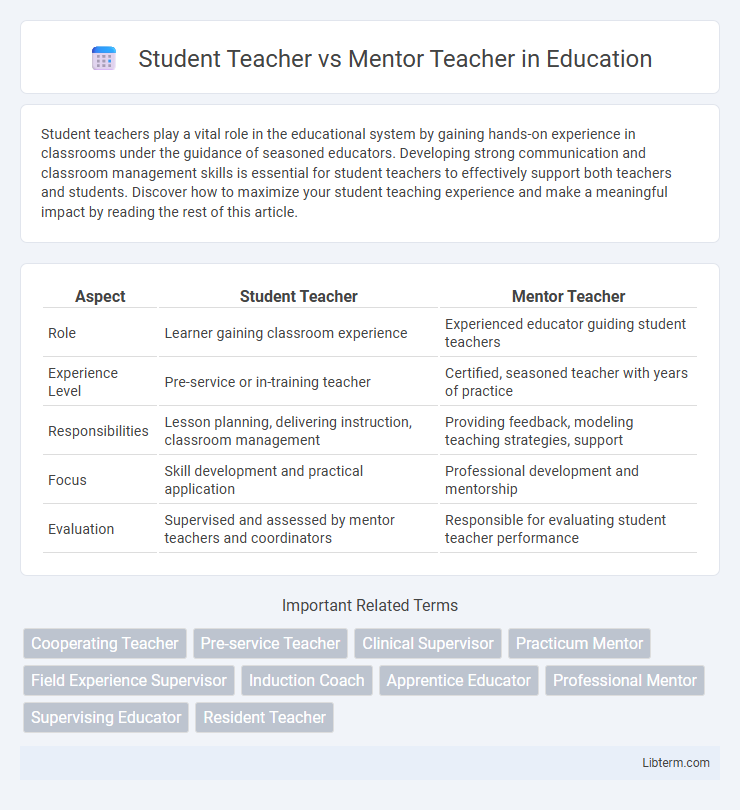Student teachers play a vital role in the educational system by gaining hands-on experience in classrooms under the guidance of seasoned educators. Developing strong communication and classroom management skills is essential for student teachers to effectively support both teachers and students. Discover how to maximize your student teaching experience and make a meaningful impact by reading the rest of this article.
Table of Comparison
| Aspect | Student Teacher | Mentor Teacher |
|---|---|---|
| Role | Learner gaining classroom experience | Experienced educator guiding student teachers |
| Experience Level | Pre-service or in-training teacher | Certified, seasoned teacher with years of practice |
| Responsibilities | Lesson planning, delivering instruction, classroom management | Providing feedback, modeling teaching strategies, support |
| Focus | Skill development and practical application | Professional development and mentorship |
| Evaluation | Supervised and assessed by mentor teachers and coordinators | Responsible for evaluating student teacher performance |
Understanding the Roles: Student Teacher vs Mentor Teacher
Student teachers are individuals undergoing practical training in a classroom setting to develop teaching skills under supervision. Mentor teachers are experienced educators who provide guidance, feedback, and support to student teachers, fostering professional growth and effective classroom management. Understanding the distinct roles helps ensure productive collaboration and a successful teaching apprenticeship.
Key Responsibilities of a Student Teacher
A student teacher's key responsibilities include planning and delivering lessons under the guidance of a mentor teacher, engaging actively with students to facilitate learning, and assessing student progress to adapt instructional strategies. They are expected to observe classroom management techniques and contribute to a positive learning environment while receiving feedback for professional growth. Collaboration with the mentor teacher on curriculum development and reflective practice is essential for developing effective teaching skills.
Core Duties of a Mentor Teacher
Mentor teachers guide student teachers by providing expert feedback, modeling effective teaching strategies, and fostering professional growth in classroom management and instructional design. They assess lesson plans, observe teaching practices, and support reflective discussions to ensure the student teacher meets educational standards. Maintaining open communication with both the student teacher and school administrators is essential for continuous development and successful student outcomes.
Qualifications Needed for Each Role
Student teachers typically must be enrolled in an accredited teacher preparation program and hold a minimum of a bachelor's degree, often requiring specific coursework in education theory and classroom management. Mentor teachers are usually experienced educators with full teaching certification and several years of successful classroom experience, demonstrating strong instructional skills and leadership capability. Both roles demand a commitment to fostering student learning, but mentor teachers must also possess the ability to guide and evaluate student teachers effectively.
The Dynamics of the Student-Mentor Relationship
The dynamics of the student-teacher versus mentor-teacher relationship center on guidance and development, where the mentor teacher provides personalized support and expertise to the student teacher's practical learning process. Mentor teachers engage in reflective dialogue and constructive feedback, fostering professional growth and confidence in classroom management and instructional strategies. This collaborative interaction enhances the student teacher's ability to integrate theory with practice, strengthening pedagogical skills through experiential learning.
Challenges Faced by Student Teachers
Student teachers often face challenges such as managing classroom discipline, balancing lesson planning with real-time teaching demands, and building confidence in their instructional abilities. Unlike mentor teachers who have years of experience and established routines, student teachers must navigate unfamiliar environments while adapting to varied student needs and expectations. Limited practical experience and the pressure of evaluation further complicate their development as effective educators.
Common Obstacles for Mentor Teachers
Mentor teachers often face common obstacles such as balancing mentorship responsibilities with their own teaching workload, managing varied student teacher skill levels, and navigating communication challenges between themselves and student teachers. Time constraints and lack of formal training in mentorship can hinder their ability to provide consistent and effective guidance. Addressing these issues requires institutional support, clear role expectations, and ongoing professional development for mentor teachers.
Benefits of a Strong Student-Mentor Partnership
A strong student teacher and mentor teacher partnership enhances practical teaching skills through guided classroom experience and personalized feedback. Mentor teachers provide essential support, helping student teachers navigate challenges, build confidence, and develop effective instructional strategies. This collaboration fosters professional growth, leading to improved student outcomes and a smoother transition into full teaching roles.
Impact on Classroom Outcomes
Student teachers bring fresh perspectives and innovative teaching strategies that can invigorate classroom dynamics, often leading to increased student engagement and creativity. Mentor teachers provide experienced guidance and model effective classroom management techniques, directly influencing improved student performance and consistency in learning outcomes. The collaboration between student and mentor teachers fosters a dynamic learning environment that enhances instructional quality and maximizes academic achievement.
Best Practices for Effective Student Teacher and Mentor Collaboration
Effective student teacher and mentor teacher collaboration hinges on clear communication, mutual respect, and structured feedback. Implementing regular reflection sessions and goal-setting meetings fosters professional growth and aligns teaching strategies. Utilizing co-planning and co-teaching opportunities enhances practical experience and strengthens instructional skills.
Student Teacher Infographic

 libterm.com
libterm.com